Kari Juusela, Tom Hojnacki – Music Theory and Composition 4
$1,250.00 Original price was: $1,250.00.$250.00Current price is: $250.00.
Digital Download: You will receive a download link via your order email after successful payment.
This core music theory course is the fourth of a four-semester curriculum that continues to build a foundation for your musical development.
Music Theory and Composition 4
This core music theory course is the fourth of a four-semester curriculum that continues to build a foundation for your musical development. The materials covered here will help you express your musical ideas as applied to composition for film, TV, and video games.
You will learn more about the essential elements of music theory and composition that will help you build your own musical language. You will further expand your knowledge of harmony and melody and expand your knowledge of scales, chords, and rhythms.
This music composition course is designed to take you from a strong review of level 3 topics—the standard deceptive resolutions of V7, classical and contemporary analysis techniques, polychord voicings, non-chord tones, approach tones, and approach tone harmonization—to topics like deceptive resolutions of dominant function harmony, contiguous dominant patterns, modal melody and harmony, hybrid voicings, quartal and quintal harmony, exotic scales, 12-tone technique, minimalism and other important twentieth century compositional techniques. We will review the rhythmic elements of Indian, Latin American, and African music and delve into the musical intricacies of the music of Indonesia, China, Japan, and Korea.
We will also continue the unique feature of blending and exploring both traditional and contemporary harmony in order to give you a historical understanding of current topics.
Music Theory and Composition 4 also features a topic called “Rhythm Jam” that will introduce you to many new and exciting rhythmic concepts such as nested tuplets, the Fibonacci series, metric modulation, hemiola, phase, Jahlas, and additive rhythm. Through forum questions you and your classmates will engage in discussions about musical creativity, craft, and inspiration.
Each week you will be asked to engage with your classmates and instructor as you work your way through the topics. Included in each topic are a number of activities and exercises designed to help you more thoroughly experience and understand the material presented. Each week there will be a composition assignment, including many which will give you the opportunity to practice writing to short film cues.
By the end of the course, you will be able to:
- Identify and apply minor and major modal melodic writing concepts with contemporary and classical approaches
- Identify and apply advanced rhythmic and melodic concepts of nested tuplets, Fibonacci Series, metric modulation, hemiola, and Jahlas
- Identify and apply advanced scales types of Lydian augmented, Lydian b7, Spanish Phrygian, Super Locrian of contemporary music and the whole tone and octatonic scale in classical music
- Differentiate and analyze alternative progressions that include deceptive resolutions of the Dominant 7th chord and symmetrical divisions of the octave
- Identify and apply advanced harmony concepts of non-tertian voicings, hybrids and Inversions, polytonal harmony, musical parallelism, and serial technique
- Understand and apply the process for re-harmonizing a given melody in both contemporary and classical styles
- Recognize and differentiate the musical elements various styles of world music
Syllabus
Lesson 1: Review Topics
Lesson 2: Modal 1
Lesson 3: Modal 2
Lesson 4: Scales, Scales, Scales
Lesson 5: Deceptive Resolutions of the Dominant 7th Chord
Lesson 6: Non-tertian Voicings
Lesson 7: This Over That
Lesson 8: Reharmonization
Lesson 9: Musical Parallelism
Lesson 10: Serial Technique
Lesson 11: Modal Interchange
Lesson 12: World Music Week
Requirements
Prerequisites and Course-Specific Requirements
Completion of Music Theory and Composition 3 or equivalent knowledge and experience is required. In addition:
- Ability to read notated music
- Ability to record MIDI in a Digital Audio Workstation (DAW)
- Ability to sync your compositions with various short video clips and export as MP4 file
Required Textbook(s)
- None required
Software Requirements
- DAW software such as GarageBand (Mac), Mixcraft (PC), Cakewalk by Bandlab (PC) etc.
Hardware Requirements
- MIDI keyboard highly recommended
- Audio interface highly recommended
- A printer so that you can print out music examples used in the course
- Scanner/phone camera to copy and export handwritten materials
- Manuscript paper with 8 or 9 staves per page
Instructors
Author & Instructor
Kari Henrik Juusela is a Finnish-American composer, performer, and educator who presently serves as dean of the Professional Writing and Music Technology Division at Berklee College of Music in Boston, Massachusetts. In addition to writing music in styles ranging from pop to contemporary classical, he enjoys playing and recording the cello, bass, guitar, piano, table, and the Finnish Kantele.
His compositions have won numerous awards from such organizations as the Vienna State Opera, the International Trumpet Guild, the London Chamber Music Society, the Composer’s Guild, GASTA, and ASCAP. He has also won the International Red Stick Composition Competition, the American Songwriting Awards Contest, the San Francisco Art Song Competition, and the Aliénor Harpsichord Composition Contest. His works have been performed at many important venues including Carnegie and Tchaikovsky Hall by internationally acclaimed ensembles and performers, as well as by numerous rock, pop, and jazz groups. He is the author of over 20 college-level courses and is the author of the Berklee Contemporary Dictionary of Music.
Dr. Juusela holds degrees from the University of Maryland, Georgia State University, and Berklee College of Music. His music is published by ISG Publications, MuusJuus Music, and Yelton Rhodes Music, and is recorded on ERM, Beauport Classical, Lakeside Records, Capstone Records, and MuusJuus Music.
Author
Tom Hojnacki enjoys an unusually varied musical career. As a keyboard player, Tom has worked with the national touring productions of the Big Apple Circus, A Chorus Line, Altar Boyz, Beautiful!, Matilda, and Finding Neverland. He has appeared with the Prague Radio, the Claflin Hill, the Plymouth Philharmonic and the New Bedford Symphony Orchestras and as a chamber musician in performances of the music of Beethoven, Brahms, Schubert, Bartok, Messiaen, and Shostakovich.
As a jazz pianist, he has performed with Billy Pierce, Joe Lovano, Jimmy Giuffre, George Garzone, Larry Coryell, the John Allmark Jazz Orchestra, the Kenny Hadley Big Band, the Cab Calloway Orchestra, and the Jazz Composers Alliance Orchestra and with the singer Aretha Franklin. As a conductor, he has led numerous performances of ballet, opera, musical theater, and symphonic repertoire. An award winning composer (GEMA, Telly), Tom has written works for musical theater, orchestra, band, jazz orchestra, chorus and various chamber ensembles. He has made a number of recordings, most notably, his Symphony No. 1 with the Prague Dvorak Orchestra and Julius Williams, conductor, on Albany Records. Tom has taught at Dean College and the New England Conservatory of Music. He is currently the assistant chair of the Harmony Department at Berklee College of Music where he teaches theory, composition, piano, and conducting. He is co-author of The Berklee Book of Jazz Harmony, with Joe Mulholland (Berklee Press/Hal Leonard, 2013).
Instructor
Rick McLaughlin’s work has been heard all over the world. A band leader, side-man, and member of the Grammy-nominated jazz group Either/Orchestra, he has performed on stages and in recording studios in places ranging from greater Boston, MA to Los Angeles, CA; from Barcelona, Spain to Rome, Italy; and from Phuket, Thailand to Addis Ababa, Ethiopia. Dozens of CDs feature Rick McLaughlin, including his own debut as a leader, Study of Light, which garnered critical acclaim (“…illuminates your aural universe with singleness and sincerity.” – Marcel Polgar, Double Bassist Magazine). He has shared the stage with a wide range of musicians, from jazz luminaries such as Don Byron, Steve Lacy, John Medeski, Danilo Perez, and John Zorn, to rock musicians Willie “Loco” Alexander, Morphine and Peter Wolf, and country music star Roger Miller. A frequent collaborator with musicians from all over the globe, McLaughlin has also performed with Ethiopia’s great singers Mahmoud Ahmed and Alemayhu Eshete, as well as the innovator behind Ethio-Jazz, Mulatu Astatke.
Although primarily known as a bassist, McLaughlin is a highly regarded teacher, most notably as Associate Professor of Harmony at Berklee College of Music, but formerly in a variety of faculty, administrative, and clinician positions at other music schools as well. These positions capitalize on the work McLaughlin has done in addition to his bass playing, as a published author, composer, and arranger.
McLaughlin graduated from the New England Conservatory of Music in Boston, MA with both B.M. and M.M. degrees, the latter he received with Academic Honors and Distinction in Performance. Former endorsements include AlterEGO instruments, Gallien-Krueger amplifiers, and Hohner Melodicas. For more information please visit Rickmclaughlin.com
What’s Next?
When taken for credit, Music Theory and Composition 4 can be applied towards these associated programs:
Associated Certificate Programs
- General Music Studies Professional Certificate
- General Music Studies Advanced Professional Certificate
- Music Theory and Composition Professional Certificate
Associated Degree Majors
- Bachelor’s Degree in Electronic Music Production and Sound Design
- Bachelor’s Degree in Guitar
- Bachelor’s Degree in Interdisciplinary Music Studies (Create Your Own Major)
- Bachelor’s Degree in Music Business
- Bachelor’s Degree in Music Composition for Film, TV, and Games
- Bachelor’s Degree in Songwriting
- Bachelor’s Degree in Songwriting and Producing Music
- Bachelor’s Degree in Music Production
- (Pre-Degree) Undeclared Option
Get Download Kari Juusela, Tom Hojnacki – Music Theory and Composition 4 at IMC.sale today!
Delivery Method
– After your purchase, you’ll see a View your orders link which goes to the Downloads page. Here, you can download all the files associated with your order.
– Downloads are available once your payment is confirmed, we’ll also send you a download notification email separate from any transaction notification emails you receive from IMC.sale.
– Since it is a digital copy, our suggestion is to download and save it to your hard drive. In case the link is broken for any reason, please contact us and we will resend the new download link.
– If you cannot find the download link, please don’t worry about that. We will update and notify you as soon as possible at 8:00 AM – 8:00 PM (UTC+8).
Thank You For Shopping With Us!

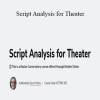
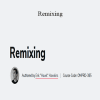
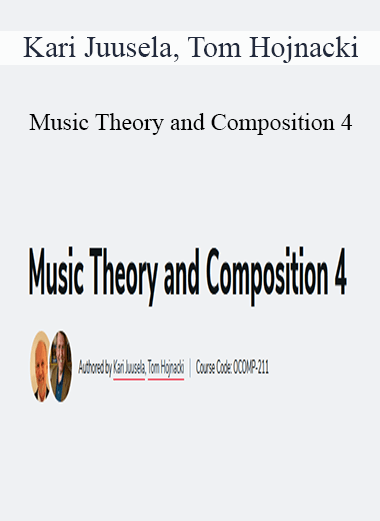
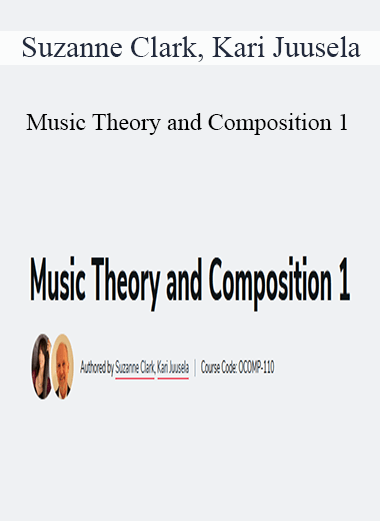
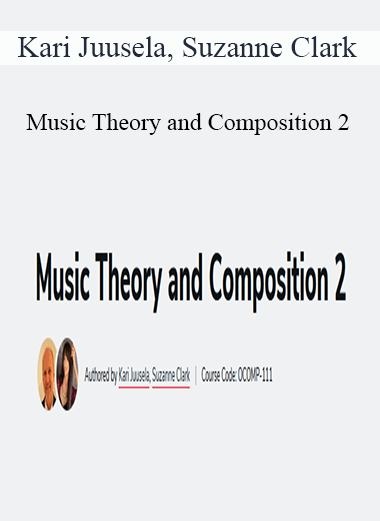
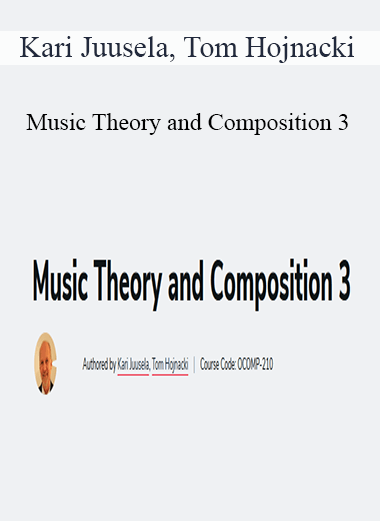
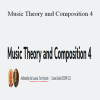
6 reviews for Kari Juusela, Tom Hojnacki – Music Theory and Composition 4
There are no reviews yet.